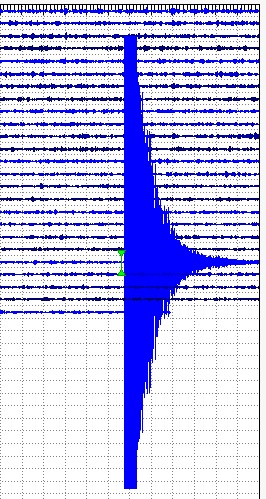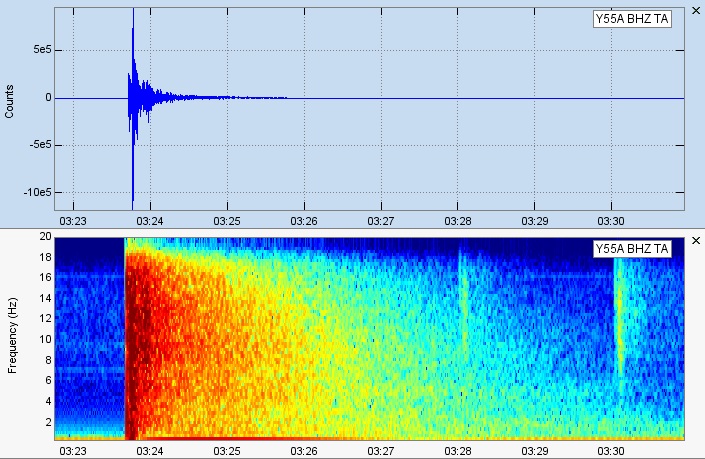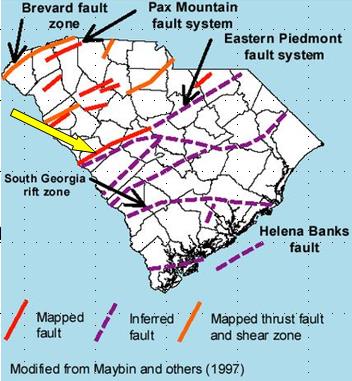It looks like you're using an Ad Blocker.
Please white-list or disable AboveTopSecret.com in your ad-blocking tool.
Thank you.
Some features of ATS will be disabled while you continue to use an ad-blocker.
share:
reply to post by gardener
From the Quakewatch thread -
My novice mind is wondering if it could be related to the recent temperature extremes.
From the Quakewatch thread -
Shallow--only 3.0 miles deep.
My novice mind is wondering if it could be related to the recent temperature extremes.
Shallow means it's more likely it was manmade
Like, a test mini nuke, or 1 being detonated to make room for newers ones?
Or a threat to move into Syria. Same old, same old terror state.
Like, a test mini nuke, or 1 being detonated to make room for newers ones?
Or a threat to move into Syria. Same old, same old terror state.
Jbird
reply to post by gardener
From the Quakewatch thread -
Shallow--only 3.0 miles deep.
My novice mind is wondering if it could be related to the recent temperature extremes.
I didn't even think about that, but it is an interesting coincidence if nothing else. I know the Carolinas and this general area have weird weather, but I was thinking this is getting a bit ridiculous. Below freezing lows to 70s highs in a week; 6-8 inches of snow and sleet to 50F+ in 24 hours?!
Before the great San Fransisco quake of 1906, South Carolina was thought to the most seismic active areas in the country. Charleston, SC had a great
quake in 1886.
Earthquakes in South Carolina are nothing new.
Earthquakes in South Carolina are nothing new.
GA just had a 4.1?
Did someone post that already?
ETA: Same one...sorry.
Did someone post that already?
ETA: Same one...sorry.
edit on 2/14/2014 by ~Lucidity because: (no reason given)
Great first post. I just put up my first tonight as well, but I think that this has been a truly strange week for shaking and quaking. Linda Howe put
up a post about more sky quakes in MN ( www.earthfiles.com... ) , we had Corvettes falling into sink holes
and now your rare rumble. Strange , strange week.
Doomsbury
Great first post. I just put up my first tonight as well, but I think that this has been a truly strange week for shaking and quaking. Linda Howe put up a post about more sky quakes in MN ( www.earthfiles.com... ) , we had Corvettes falling into sink holes and now your rare rumble. Strange , strange week.
Thanks Just my first thread though, I do post from time to time but I do more lurking than anything. This place is so busy sometimes I feel like I'd just be repeating 5 other people or way behind in the discussion if I join in!
I read about the Corvette sinkhole, that actually made me a little sad.
So they don't know which fault it is?
USGS
Faults Earthquakes everywhere occur on faults within bedrock, usually miles deep. Most bedrock beneath the inland Carolinas was assembled as continents collided to form a supercontinent about 500-300 million years ago, raising the Appalachian Mountains. Most of the rest of the bedrock formed when the supercontinent rifted apart about 200 million years ago to form what are now the northeastern U.S., the Atlantic Ocean, and Europe.
At well-studied plate boundaries like the San Andreas fault system in California, often scientists can determine the name of the specific fault that is responsible for an earthquake. In contrast, east of the Rocky Mountains this is rarely the case.
The inland Carolinas region is far from the nearest plate boundaries, which are in the center of the Atlantic Ocean and in the Caribbean Sea. The region is laced with known faults but numerous smaller or deeply buried faults remain undetected. Even the known faults are poorly located at earthquake depths. Accordingly, few, if any, earthquakes in the inland Carolinas can be linked to named faults. It is difficult to determine if a known fault is still active and could slip and cause an earthquake. As in most other areas east of the Rockies, the best guide to earthquake hazards in the seismic zone is the earthquakes themselves.
USGS
Now that the Transportable Array is in its eastern phase (dispersed in a tight network all over the eastern US), I was able to look up a station quite
close to the epicenter. So close, in fact, that this quake clipped the station. This is from station TA.Y55A. From the S&P differential, I estimate
this station to be about 34 to 38 km from the epicenter. I also downloaded the raw seismic data with my rig, and I have a couple pretty pictures for
you's-
Here is the helicorder plot I generated of it (I cropped just the quake):

And here is the associated amplitude waveform and spectrograph:

Being that I live in Western North Carolina, I am surprised I didn't feel it, but then again, I was at work, just coming off a break. But I am on it, live monitoring that station in case another one happens. Don't see any aftershocks yet. I wonder if I'd actually feel it before my rig registers it, being that close and all. That's a toss up.
Here is the helicorder plot I generated of it (I cropped just the quake):

And here is the associated amplitude waveform and spectrograph:

Being that I live in Western North Carolina, I am surprised I didn't feel it, but then again, I was at work, just coming off a break. But I am on it, live monitoring that station in case another one happens. Don't see any aftershocks yet. I wonder if I'd actually feel it before my rig registers it, being that close and all. That's a toss up.
Here's a map of SC faults. The quake happened in Edgefield Co, where the yellow arrow is, of which the Eastern Piedmont fault system runs right thru.
We locals call it the fall line, the separation btwn the flat lands and the piedmont hills. The soil changes from grey clay in the flatlands to sandy
in the sand hills to red clay up here in the piedmont. You can see the fall line real clear on a google map, runs right across the middle of the
state.

I'm in Charleston, someone as talking about hearing about it, we didn't feel anything.
reply to post by TrueAmerican
Hi TA! Glad you're here and monitoring it! Thanks for the pretty pics and graphs. It clipped the the station??? Wow. I had forgotten about the portable arrays they have set up. Can you tell me if I'm right in that it was a reverse fault based on USGS Moment Tensor pg? I have a hard time understanding their info 'cause I'm not that tech oriented, just enough to get me into trouble!!!
Hi TA! Glad you're here and monitoring it! Thanks for the pretty pics and graphs. It clipped the the station??? Wow. I had forgotten about the portable arrays they have set up. Can you tell me if I'm right in that it was a reverse fault based on USGS Moment Tensor pg? I have a hard time understanding their info 'cause I'm not that tech oriented, just enough to get me into trouble!!!
reply to post by SCGrits
Yes, I believe you have Identified that correctly as a reverse fault, but there are people here who can read those better than me. Very good though! Star for joo!
Yes, I believe you have Identified that correctly as a reverse fault, but there are people here who can read those better than me. Very good though! Star for joo!
reply to post by TrueAmerican
Good catch! This is why ATS is great. I never would have thought to check for something like that, but again I'm not very versed in the subject of tectonics and such.. I'll be going to bed soon but I will come back to see the results, if any. I would think any aftershocks to this would be difficult to feel without equipment. ETA: Unless you were closer to the epicenter, of course.
Good catch! This is why ATS is great. I never would have thought to check for something like that, but again I'm not very versed in the subject of tectonics and such.. I'll be going to bed soon but I will come back to see the results, if any. I would think any aftershocks to this would be difficult to feel without equipment. ETA: Unless you were closer to the epicenter, of course.
edit on 15-2-2014 by duke396 because: (no
reason given)
reply to post by duke396
Thanks, and glad to be of help.
I must say though, quakes that big in such a strange spot make me a little nervous when no aftershocks occur. Could be a foreshock, but let's hope the heck not.
Thanks, and glad to be of help.
I must say though, quakes that big in such a strange spot make me a little nervous when no aftershocks occur. Could be a foreshock, but let's hope the heck not.
reply to post by TrueAmerican
Well people have been saying for years that we're overdue for another "big one"...
Well people have been saying for years that we're overdue for another "big one"...
NW GA reporting in:
I didn't feel a thing, but my cat sure did. She jumped up my lap and had her very best insanity face on. (Big eyes, ears turned sideways. The kind of expression that says " the voices want me to borrow your zippo").
Then again, maybe she just wanted my lighter.
She is an awfully irresponsible cat..
I didn't feel a thing, but my cat sure did. She jumped up my lap and had her very best insanity face on. (Big eyes, ears turned sideways. The kind of expression that says " the voices want me to borrow your zippo").
Then again, maybe she just wanted my lighter.
She is an awfully irresponsible cat..
reply to post by DC434L2A
Lol, I'd keep an eye on that cat if I were you! Funny things animals are. My dog is pretty laid back most of the time (6 year old Pit) and he had no reaction to this at all that I saw. Pretty sure he slept through it until I finally stood up to go ask if anyone else felt it.
Lol, I'd keep an eye on that cat if I were you! Funny things animals are. My dog is pretty laid back most of the time (6 year old Pit) and he had no reaction to this at all that I saw. Pretty sure he slept through it until I finally stood up to go ask if anyone else felt it.
duke396
reply to post by TrueAmerican
Well people have been saying for years that we're overdue for another "big one"...
Yeah well, that's probably on the New Madrid you are referring to? Or are you talking about Charleston?
On another note, a little birdy and I are having a conversation behind the scenes, though it might interest you:
They state:
Recent weather extremes in that area - simply coincidence or possibly related ?
My response:
Possibly a connection. The quake was shallow, and who knows, maybe the weight of all that snow melting today created a sort of glacial rebound effect, setting off the fault. *shrugs* Not sure.
reply to post by TrueAmerican
I was thinking more local than that, on the map shown earlier in the thread one appears to pass through York / Chester / Lancaster counties so pretty much under my feet. But the New Madrid would probably be more of an issue.
That is an interesting idea you have there. I wonder if there's any connection between this instance, and times of the past where we have gotten large (for the area, at least) amounts of snow compared to when our earthquakes happened. I don't really have the energy to research that right now but I may end up looking into it tomorrow after work. It always melts pretty quickly here, usually gone from roads in a day or two and no trace at all within a week so I wonder what kind of effect that could have.
ETA: I'm hesitant to be the one to say this year's weather is more extreme than the last, because it seems like people say that every year here. I've never bothered to actually check historical data to confirm or deny...
ETA again: Just saw this article from my area about the quake last night, for anyone who may be interested.
www.heraldonline.com...
Hmm.
I was thinking more local than that, on the map shown earlier in the thread one appears to pass through York / Chester / Lancaster counties so pretty much under my feet. But the New Madrid would probably be more of an issue.
That is an interesting idea you have there. I wonder if there's any connection between this instance, and times of the past where we have gotten large (for the area, at least) amounts of snow compared to when our earthquakes happened. I don't really have the energy to research that right now but I may end up looking into it tomorrow after work. It always melts pretty quickly here, usually gone from roads in a day or two and no trace at all within a week so I wonder what kind of effect that could have.
ETA: I'm hesitant to be the one to say this year's weather is more extreme than the last, because it seems like people say that every year here. I've never bothered to actually check historical data to confirm or deny...
ETA again: Just saw this article from my area about the quake last night, for anyone who may be interested.
www.heraldonline.com...
The quake at 10:23 p.m. was centered on the edge of Thurmond Lake, just north of the area hardest hit by this week's snow and ice storm.
Hmm.
edit on 15-2-2014 by duke396 because: (no reason given)
new topics
-
Anti-Government Protest in Serbia
Social Issues and Civil Unrest: 1 hours ago -
The Effects of Electric Fields and Plasma on Plant Growth
Science & Technology: 2 hours ago -
The Daily Mail trying to imply “it’s aliens”
Dissecting Disinformation: 9 hours ago -
Swarms of tiny 'ant-like' robots lift heavy objects and navigate obstacles
Science & Technology: 10 hours ago
top topics
-
The Carpet Coating that Attacked the Environment
Medical Issues & Conspiracies: 16 hours ago, 15 flags -
NYPD Chief Jeffrey Maddrey Resigns - Forced Officers to Give Sex for Overtime Pay and Favors.
Posse Comitatus: 12 hours ago, 9 flags -
Microplastics in your drinks
Medical Issues & Conspiracies: 17 hours ago, 5 flags -
Swarms of tiny 'ant-like' robots lift heavy objects and navigate obstacles
Science & Technology: 10 hours ago, 5 flags -
The Daily Mail trying to imply “it’s aliens”
Dissecting Disinformation: 9 hours ago, 4 flags -
The Effects of Electric Fields and Plasma on Plant Growth
Science & Technology: 2 hours ago, 3 flags -
Anti-Government Protest in Serbia
Social Issues and Civil Unrest: 1 hours ago, 2 flags
active topics
-
Statements of Intent from Incoming Trump Administration Members - 2025 to 2029.
2024 Elections • 49 • : WeMustCare -
Incoming TRUMP Admin will Declare a National Emergency to Mass Deport People Here Illegally.
Social Issues and Civil Unrest • 119 • : WeMustCare -
The Effects of Electric Fields and Plasma on Plant Growth
Science & Technology • 3 • : ChaoticOrder -
-@TH3WH17ERABB17- -Q- ---TIME TO SHOW THE WORLD--- -Part- --44--
Dissecting Disinformation • 3779 • : duncanagain -
Democrat Leader Hakeem Jeffries Promotes HATE After 2nd Attempt to Murder Trump in 2024.
US Political Madness • 43 • : BernnieJGato -
U.S. Officially Withdraws From the World Health Organization
Breaking Alternative News • 73 • : WeMustCare -
‘Something horrible’: Somerset pit reveals bronze age cannibalism
Ancient & Lost Civilizations • 13 • : CosmicFocus -
Democrat New York Mayor ERIC ADAMS INDICTED on Federal Corruption Charges.
Mainstream News • 40 • : marg6043 -
JOSEPH BIDEN Says Democrat Coup Leaders Forced Him to Resign the Presidency - Eff 1.20.2025.
2024 Elections • 56 • : xuenchen -
Post A Funny (T&C Friendly) Pic Part IV: The LOL awakens!
General Chit Chat • 7944 • : underpass61
